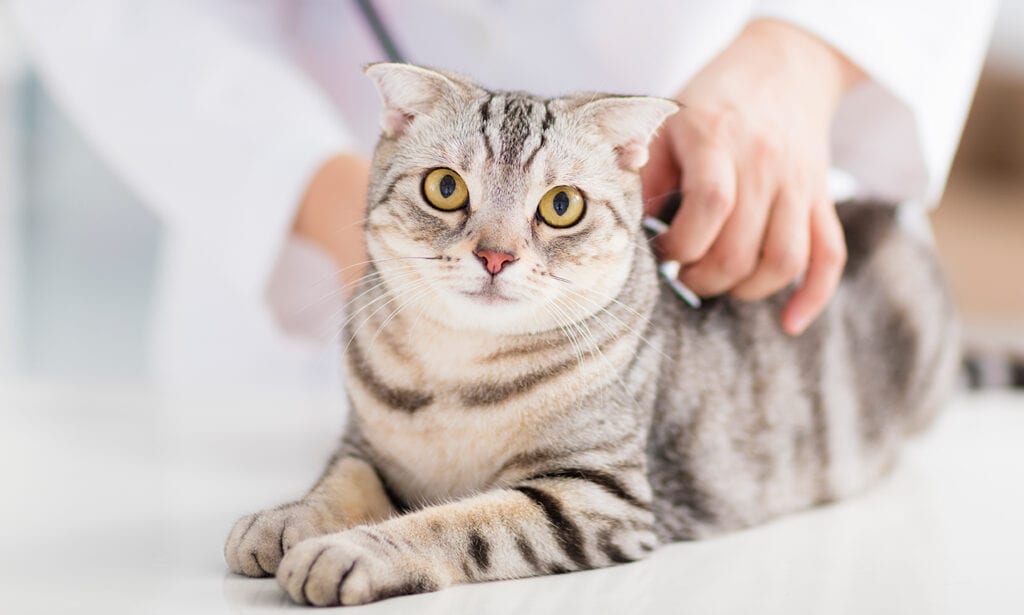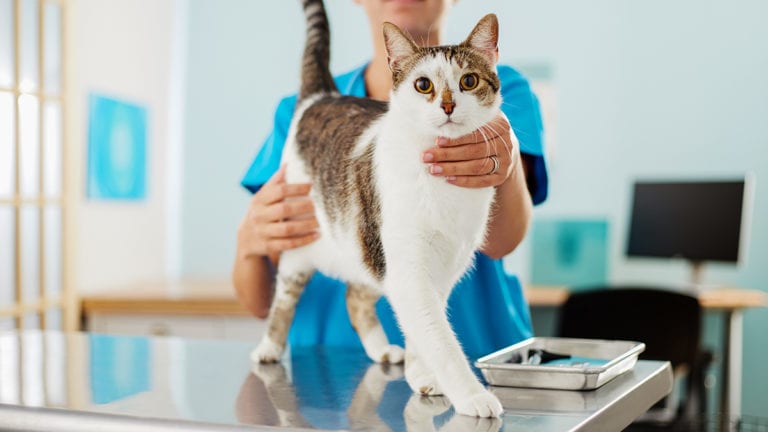Heartworm in cats is a scary disease that easily can hit close to home. Signs of heartworms in cats range from no symptoms at all to sudden collapse or death.
We spoke to vets about how to prevent heartworm disease in cats; how vets treat heartworm disease in cats; and more.
What Are Heartworms?
Heartworms, Dirofilaria immitis, are foot-long worms that live in the heart, as well as in lungs and blood vessels of affected animals.
Spread by over 70 species of mosquitoes, heartworms can cause lung disease, heart failure and damage to other organs in the body, says Bianca A. Zaffarano, DVM, Director at Veterinary Emergency Group in New York.
In addition to cats, they can infect a range of other mammal species, she adds, including dogs, ferrets, wolves, coyotes, foxes, sea lions, otters and, in rare cases, humans.
How Do Cats Get Heartworms?
Cats get infected with heartworms via heartworm-positive mosquitos. Here’s how it works:
- First, a mosquito bites an animal who already is infected with heartworms. At this time, the mosquito picks up baby worms in the blood called microfilariae (the youngest larvae), and these microfilariae live inside the insect for 10 days to two weeks as they mature into their infective larvae stage.
- When that infected mosquito bites a cat, the infective larvae are deposited on the surface of the animal’s skin and enter the new host through the mosquito’s bite wound, Dr. Zaffarano explains.
- Once they’re inside the cat’s tissues, they wriggle through the body and are whisked into the bloodstream. “It takes about six months for them to move around the body, and through the tissues and into the bloodstream,” she adds.
- From there, the infective larvae mature into adult worms in the heart, lungs and blood vessels.
Dogs are the ideal host for heartworms, as many of the worms in cats die before reaching their adult stage, Dr. Zaffarano says. As a result, a cat with heartworms typically has very few of them—one to three at the most—and the worms usually live two to three years. However, during that short period of time, they can cause some serious damage.
Signs of Heartworm Disease in Cats
About four months after a mosquito with microfilariae infects a cat, the first signs of heartworms can start to appear with symptoms ranging from difficulty breathing to sudden death, Dr. Zaffarano says. Or your cat can show no symptoms at all.
“The symptoms can be very subtle, and people can mistake them for other things, or they can be very dramatic,” she says.
Cats with immature worms may show the following signs, which often resemble those of feline asthma:
- Generally feeling unwell
- Intermittent coughing
- Difficulty breathing
- Low energy (lethargy)
- Vomiting
- Weight loss
Cats with mature worms may show the following common clinical signs of heartworm infection:
- Vomiting
- Fluid in the belly
- Lethargy
- Coughing
- Difficulty breathing
- Abnormally low blood pressure (shock)
- Death
While they mainly live in the heart, lungs and blood vessels, heartworms can travel to other parts of the cat’s body.
“They can migrate to the central nervous system—the brain, the spinal cord—as well as the eyes and other organs,” Dr. Zaffarano says. “The damage they cause in other parts of the body results in all kinds of other complications and inflammation when the worms die.”
Diagnosing Heartworm in Cats
Vets use two tests to diagnose heartworm in cats: an antigen blood test and an antibody blood test.
- An antigen test checks for the presence of certain proteins made by the female heartworm.
- An antibody test checks for exposure to heartworm larvae and for the cat’s immune response against the heartworm parasite.
Why do cats need both heartworm tests? Because cats are much less likely to have adult heartworms, they often have a single-sex infection, which means there may not be any female worms to detect, Dr. Zaffarano says.
If the veterinarian thinks the cat is positive, they may choose to do an X-ray, a radiograph or an ultrasound to confirm a diagnosis of heartworm. Sometimes a good cardiologist can actually see the worms on the ultrasound, Dr. Zaffarano adds.
Treatment of Heartworm in Cats
Unfortunately, the go-to drug that destroys both mature and immature heartworm infection in dogs—melarsomine dihydrochloride—is not safe for cats. So, treating feline heartworm disease in infected cats can be difficult.
There’s no way to kill the adult heartworms, so cats have to live with any mature heartworms until the heartworms die, Dr. Zaffarano says. Instead, you’ll work with your vet to alleviate symptoms of heartworm disease.
“You can try to diminish their inflammation, reduce their cough and, if they have liver problems, you can try and support liver function,” Dr. Zaffarano says. “Sometimes, you may have to go down the antibiotics or anti-inflammatory path to help with heart function.”
“With cats, it’s supportive maintenance and dealing with inflammation that occurs from these worms,” adds Bruce Gordon Kornreich, DVM, a board-certified veterinary cardiologist and associate director of the Cornell Feline Health Center at Cornell University College of Veterinary Medicine in Ithaca, New York. “If the cat is having trouble with heartworm-associated respiratory disease, your veterinarian can give [him] oxygen and corticosteroids to help with inflammation.”
Prevention is key.
Preventing Heartworm in Cats
The best way to treat feline heartworm disease is to avoid it in the first place.
The American Heartworm Society (AHS) recommends pet parents get their pet tested every 12 months for heartworm and use heartworm preventive medications for cats year-round, no matter where you live.
Keep your cat on a safe, proven-effective heartworm preventive medicine that contains ivermectin or selamectin, says Dr. Kornreich. These products, available only through your veterinarian, are formulated to kill heartworms in their active, pre-adult stage.
Heartworm preventives come in two forms:
- Topical: Topicals are poured on top of the shoulder blades. Revolution® Plus for cats, for example, is a topical product that contains selamectin and sarolaner. It’s also used for control of fleas, ticks, ear mites, and intestinal parasites.
- Pill: The flavored tablet form looks like a treat. Interceptor™ is a chewable option that contains milbemycin. It’s also used to help control intestinal parasites.
“They have the same class of heartworm preventive drug, and some brands have other things in it, like drugs that will prevent intestinal parasites,” Dr. Zaffarano says.
Chat with your vet about the best heartworm prevention treatment for your cat.
FAQs About Heartworm in Cats
Q:
How common is heartworm in cats?
Q:
Is heartworm contagious in cats?
Q:
How do you know if your cat has heartworms?
Q:
Are there any natural home remedies for heartworm in cats?
Q:
When should I start heartworm prevention for my cat?
Chat with your vet on the best heartworm prevention treatment for your cat. Next, learn about flea and tick prevention for cats.
Expert input provided by Bianca A. Zaffarano, DVM, director at Veterinary Emergency Group in New York; and Bruce Gordon Kornreich, DVM, a board-certified veterinary cardiologist and associate director of the Cornell Feline Health Center at Cornell University College of Veterinary Medicine in Ithaca, New York.
This content was medically reviewed by Chewy vets.
More on caring for your cat:
Share:












